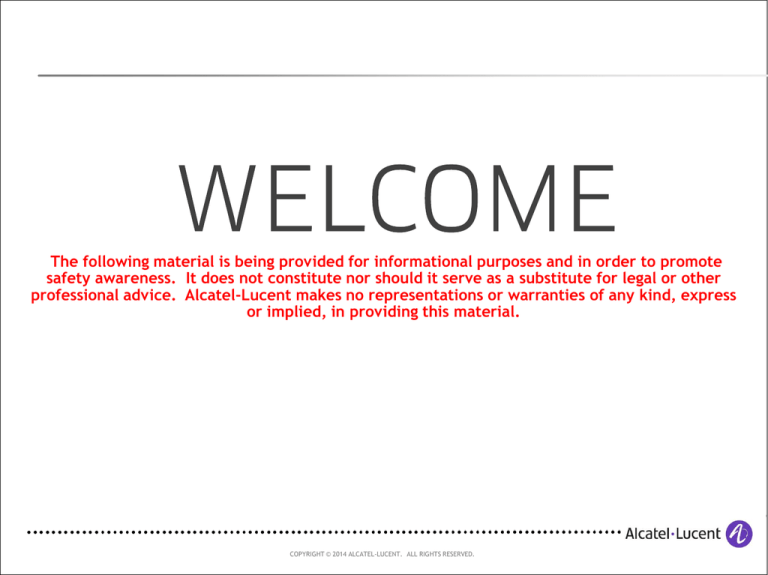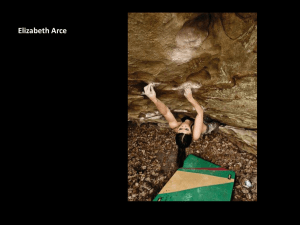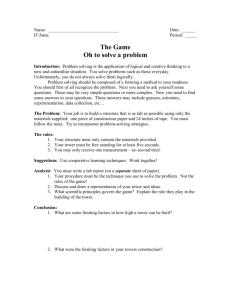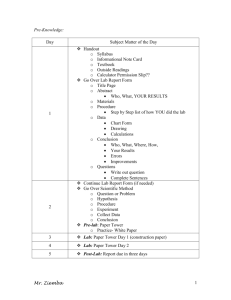
•The following material is being provided for informational purposes and in order to promote
safety awareness. It does not constitute nor should it serve as a substitute for legal or other
professional advice. Alcatel-Lucent makes no representations or warranties of any kind, express
or implied, in providing this material.
COPYRIGHT © 2014 ALCATEL-LUCENT. ALL RIGHTS RESERVED.
EHS COMMITMENT FROM THE TOP
My ambition is for AlcatelLucent to be the recognized
leader in sustainability and
responsible business innovation
for the technology industry.
Michel Combes
CEO Alcatel-Lucent
2013 Sustainability Report
ZERO TOLERANCE SAFETY PRINCIPLES
We always use the appropriate Personal Protective Equipment and Fall Arrest systems when working at heights.
We never work under the influence of alcohol or drugs.
o
We never work on energized equipment or in the vicinity of high voltage power transmission lines unless qualified.
We always have a lift plan when performing a critical lift.
o
We never exceed speed limits or travel at speeds which are dangerous for the type of road, vehicle, or conditions.
We always wear seat belts when travelling in, or operating vehicles.
We never use a hand held phone or text while driving.
COPYRIGHT © 2014 ALCATEL-LUCENT. ALL RIGHTS RESERVED.
Energy Control Procedures- Lockout Tagout
Tower Climbing Awareness
LES109WG – December 2014
AGENDA
Program Objectives
EHS Policy
Introduction
General Requirements
Medical Examination
Training and Certification
Tower Climbing Safety and Rescue Equipment
Clothing and Personal Protective Equipment
Tower Safety Climbing Procedures
COPYRIGHT © 2014 ALCATEL-LUCENT. ALL RIGHTS RESERVED.
PROGRAM OBJECTIVES
The objective of this course is to gain an understanding of:
hazards associated with Tower Climbing operations
medical examination requirements
training requirements applicable to employees
participating in tower climbing operations
safety and rescue equipment to be used in climbing
operations and
safe working procedures while performing tower
climbing operations
COPYRIGHT © 2014 ALCATEL-LUCENT. ALL RIGHTS RESERVED.
ALCATEL-LUCENT EHS POLICY
The Alcatel-Lucent Environment, Health and
Safety Policy provides the framework for EHS
performance improvement in support of the
business strategy.
COPYRIGHT © 2014 ALCATEL-LUCENT. ALL RIGHTS RESERVED.
INTRODUCTION
Climbing towers is a complex and dangerous operation that requires a
high level of mental alertness, physical fitness, preparation, knowledge,
experience and training.
Accidental falls are the second leading cause of
occupational fatalities worldwide, resulting in
about 11,000 deaths per year. Death is common
in falls of 2 meters or more.
Falls from Telecommunications Towers have
resulted in fatalities, globally and for ALU
contractors involved in projects granted to ALU by
its customers.
This training will help Alcatel-Lucent reduce the
risk of serious injuries or fatalities to employees
that climb towers.
COPYRIGHT © 2014 ALCATEL-LUCENT. ALL RIGHTS RESERVED.
GENERAL REQUIREMENTS
Be examined and medically certified as physically
capable of climbing towers by a qualified physician
Be trained and certified in the proper and safe
procedures for climbing towers, including rescue
procedures
Be trained and certified in first aid and cardiopulmonary
resuscitation (CPR)
Be provided with, and use, the approved tower climbing
safety and rescue equipment (including a full-body
harness) that is appropriate for the type(s) of tower(s) to
be climbed
Be attached to the tower at all times during climbing
operations
Follow all tower climbing safety procedures
COPYRIGHT © 2014 ALCATEL-LUCENT. ALL RIGHTS RESERVED.
MEDICAL EXAMINATION
Prior to being trained, all affected employees
shall be examined by a qualified physician who
will certify, in writing, whether or not the
employee is physically capable to perform the
stressful and strenuous activities involved in
climbing towers.
The written certification should be addressed to
the employee's direct supervisor, who should sign
and date it to indicate that he/she has received
and read it. Medical examinations of certified
employees shall be conducted at a minimum of 3year intervals.
COPYRIGHT © 2014 ALCATEL-LUCENT. ALL RIGHTS RESERVED.
TRAINING AND CERTIFICATION
After being medically certified, and prior to climbing any towers, all
affected employees shall successfully complete tower climbing safety and
rescue training and certification. The training and certification shall:
include a classroom session, a written
examination, and actual climbing and rescue
exercises on a real tower in the field similar
to the type of tower that employees will
encounter during their job
include a personalized and dated certificate
to each affected employee that successfully
completes the written examination and the
field exercises
be repeated every 5 years
COPYRIGHT © 2014 ALCATEL-LUCENT. ALL RIGHTS RESERVED.
TRAINING AND CERTIFICATION cont´d…
Affected employees may be permitted to become internal tower
climbing safety and rescue instructors if they:
possess strong tower climbing skills
have a minimum of 5 years tower climbing experience
exhibit strong communications and mentoring skills
have successfully completed and are certified in an approved “Train-the-Trainer"
tower climbing safety course
deliver the approved course in the exact same manner in which it was delivered to
them
are monitored initially and periodically by the EHS Coordinator (or other
designated individual) to ensure that the course integrity remains unchanged
maintain their skills through continuous education and practice with new tower
climbing safety tools and techniques
All affected employees shall be trained in first aid and cardiopulmonary resuscitation
(CPR) prior to climbing any towers
All affected employees shall practice safe climbing techniques and rescue procedures
at least once per year
COPYRIGHT © 2014 ALCATEL-LUCENT. ALL RIGHTS RESERVED.
•TOWER CLIMBING SAFETY AND RESCUE EQUIPMENT
Individual Safety equipment to be used by certified employees
Note: Always follow manufacturer's instructions
Spreader snap
Fall arrestor
Carabiners
(at least 2)
By pass lanyard
Dorsal extension
appropriately-sized
full-body harness
anchor strap
COPYRIGHT © 2014 ALCATEL-LUCENT. ALL RIGHTS RESERVED.
Equipment bag
•TOWER CLIMBING SAFETY AND RESCUE EQUIPMENT cont…
Safety equipment to be provided to the tower climbing work crew for shared use
Note1: Always follow manufacturer's instructions
Note 2: Type and amount of shared PPE and Rescue equipment may vary depending on type of structures
to climb and locally available designs of these devices.
carabiners
(at least 3)
decent rope (1.3 cm x 91 meters)
With descending device
rope grab
Fisk descender
rope termination plate
COPYRIGHT © 2014 ALCATEL-LUCENT. ALL RIGHTS RESERVED.
vertical lifeline
(1.6 cm x 91 meters)
rescue equipment bag
CLOTHING AND PERSONAL PROTECTIVE
EQUIPMENT
All certified employees shall wear the following clothing and personal
protective equipment at all times during tower climbing activities:
full body safety harness that meets the specifications outlined in
the Alcatel-Lucent Tower Safety Climbing Program
hard hats (both on the tower and on the ground in the vicinity of the tower)
gloves that are water resistant, snug, and have good gripping ability
shoes with rigid non-slip soles
safety glasses (tinted safety glasses are recommended when working in bright
sunlight)
long pants and long-sleeved shirts
COPYRIGHT © 2014 ALCATEL-LUCENT. ALL RIGHTS RESERVED.
TOWER CLIMBING SAFETY PROCEDURE:
(PRE-CLIMB SAFETY MEETING AND PLAN)
Prior to each climb the leader of the work crew shall conduct a Pre-Climb Safety Meeting to:
• identify and review potential hazards and how to deal with them
• identify appropriate equipment and tools to be used for the job
• plan out the actual climb and identify appropriate anchorage points
• review rescue and emergency procedures
• develop and review written, site-specific Tower Climbing Safety Work Plan
COPYRIGHT © 2014 ALCATEL-LUCENT. ALL RIGHTS RESERVED.
TOWER CLIMBING SAFETY PROCEDURE:
(POTENTIAL HAZARDS)
The potential hazards of working on or near towers include, but are not limited to:
falling from the tower
bent, loose, wet or missing ladder rungs and/or tower support members
loose or rusty bolts
antennas, equipment and/or structural members in the climbing path
snagging tools and/or clothing on tower protrusions
falling tools or equipment
energized antennas
high winds
over exertion
electrical wires and/or equipment
insects, birds or other animals
bright sunshine or intense glare
extreme heat or cold
chance of rain, snow or hail
snow and/or ice on the tower or falling from it
chance of extreme weather such as thunderstorms, hurricanes, typhoons or tornadoes
chance of earthquakes
potential for violence
COPYRIGHT © 2014 ALCATEL-LUCENT. ALL RIGHTS RESERVED.
TOWER CLIMBING SAFETY PROCEDURE:
(PRE-CLIMB SAFETY INSPECTION)
•Each tower climbing work crew shall inspect the tower prior to each climb. If any of
the following defects are found, the crew shall not climb the tower until the problem
is corrected by a qualified tower construction professional:
loose structures, missing bolts, broken parts or signs of vandalism
cracks, bends, loose connections or metal fatigue
rust or buckling due to water freezing in pipe supports
guy wires that are broken, frayed or not in tension
tower is not plumb (i.e., twisted, crooked or leaning)
COPYRIGHT © 2014 ALCATEL-LUCENT. ALL RIGHTS RESERVED.
TOWER CLIMBING SAFETY PROCEDURE:
(PRE-CLIMB EQUIPMENT INSPECTION)
All certified employees shall inspect their tower climbing safety and
rescue equipment prior to each climb.
Harnesses, lanyards and accessories with cuts, worn spots, excessive
abrasions, material separation or fatigue, or cracks shall be removed
from service immediately, rendered unusable, tagged as "defective" and
discarded.
COPYRIGHT © 2014 ALCATEL-LUCENT. ALL RIGHTS RESERVED.
TOWER CLIMBING SAFETY PROCEDURE:
(SAFE CLIMBING)
While climbing, affected employees shall:
wear an approved full-body harness
wear appropriate clothing and personal
protective equipment
use the appropriate fall arrestor if the tower
is equipped with a climbing protection system
use a dual or “Y” lanyard if the tower is not
equipped with a climbing protection system
visually determine that lanyards are fastened
at both ends before climbing
remain attached to the tower at all times
maintain three points of contact with the
tower during climbing (i.e., two legs & one
hand, or two hands & one leg) at all times
COPYRIGHT © 2014 ALCATEL-LUCENT. ALL RIGHTS RESERVED.
TOWER CLIMBING SAFETY PROCEDURE:
(SAFE CLIMBING)... cont.
While climbing, affected employees shall:
Horizontal Life Line
install a horizontal lifeline when it is
necessary to repeatedly cross an open
span by walking on a horizontal tower
member
use a separate tool belt to securely attach
and carry tools up to a maximum of 10
kilograms
use a rope to raise or lower tools or
equipment in excess of 10 kilograms
continually monitor and evaluate weather
conditions and communicate any
imminent changes to the work crew
leader
COPYRIGHT © 2014 ALCATEL-LUCENT. ALL RIGHTS RESERVED.
TOWER CLIMBING SAFETY PROCEDURE:
(SAFE CLIMBING)... cont.
Certified employees shall NOT climb towers:
without at least one other certified climber
without a ground crew of at least one worker trained in
Aid/CPR
while intoxicated or under the influence of mood-altering
drugs(prescription or not)
during an illness or when suffering from such physical symptoms
such as dizziness, weakness, abdominal pains, and/or muscle cramps
during rain, snow, hail, thunderstorms, hurricanes, typhoons, or while tornado
warnings are in effect
that are covered with ice and/or snow unless it can be removed without
endangering the climbers or the ground crew
during periods of wind 45 km/h or greater
during periods of fog that is thick enough to completely obscure all climbers from the
vision of the ground crew
COPYRIGHT © 2014 ALCATEL-LUCENT. ALL RIGHTS RESERVED.
TOWER CLIMBING SAFETY PROCEDURE :
(SAFE CLIMBING…cont…)
While climbing, certified employees shall
NOT
allow the lanyard length to permit a free
fall greater than 2 meters
attach lanyards to coaxial cables, antennas
or antenna mounting supports
slide lanyards over sharp metal tower
members
attach tools or equipment to their harness
climb, rest or work directly underneath a
suspended load
COPYRIGHT © 2014 ALCATEL-LUCENT. ALL RIGHTS RESERVED.
TOWER CLIMBING SAFETY PROCEDURE:
(WORKING AT NIGHT)
Working on towers at night is permitted if it is not
possible to re-schedule the work to daylight hours AND
the following measures are taken (in addition to those
listed in Safe Climbing Section):
all climbers shall maintain radio contact with
the ground crew at regular intervals
all climbers shall use hard hats that are
equipped with a light of sufficient illumination
to allow the work to be done safely
All climbers have resting periods as
established by ALU guidelines or by local
regulations.
COPYRIGHT © 2014 ALCATEL-LUCENT. ALL RIGHTS RESERVED.
..AND
REMEMBER THAT…
•Tower Climbing Safety Training is MANDATORY for individuals
utilizing Fall Arresting devices.
•This training instructs on the proper selection and use of an
anchorage point, securely hooking up the equipment, and
safely moving from one area to the next.
•Contact your EHS Professional to schedule training. You must
learn how to maintain the equipment. Always inspect fall
protection equipment components before every use. Remove
from service if worn, frayed, defective, or subjected to
impact load as a result of a fall.
COPYRIGHT © 2014 ALCATEL-LUCENT. ALL RIGHTS RESERVED.
SUMMARY
Be examined and medically certified as physically capable of climbing towers.
Be provided with, and use, the approved tower climbing safety and rescue
equipment that is appropriate for the type(s) of tower(s) to be climbed
Follow safe and proper work procedures while performing tower climbing
operations.
Know what clothing and personal protective should be worn during tower
climbing activities
Perform a Pre-Climb Safety Meeting and Plan prior to each job
Complete mandatory training requirements for participating in tower climbing
operations (i.e. First Aid/CPR, Tower Climbing Safety Training and Rescue
Training and certification)
Follow up with your local EHS Resource to get more information of hazards
associated with Tower Climbing operations and arrange for required training
COPYRIGHT © 2014 ALCATEL-LUCENT. ALL RIGHTS RESERVED.
Questions or Comments?
Contact:
Your local EHS Coordinator for Tower Climbing Safety and Rescue Equipment
and information on how to be a certified climber.
NOTE: This training module is an “AWARENESS SESSION” only. It does not
certify you as a tower climber.
Regional EHS Leaders
APAC - Ong Wee Liang
CALA - Martha Montes
EMEA - Robert Nolan
NAR - Rich Quick
COPYRIGHT © 2014 ALCATEL-LUCENT. ALL RIGHTS RESERVED.



